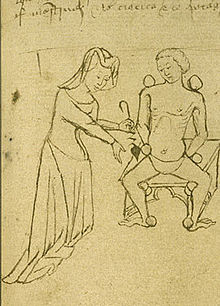Dorotea Bucca
Artikel ini perlu diwikifikasi agar memenuhi standar kualitas Wikipedia. Anda dapat memberikan bantuan berupa penambahan pranala dalam, atau dengan merapikan tata letak dari artikel ini.
Untuk keterangan lebih lanjut, klik [tampil] di bagian kanan.
|

Dorotea Bocchi (1360-1436) (juga terkadang disebut sebagai Dorotea Bucca) adalah seorang wanita bangsawan Italia yang dikenal sebagai ahli kedokteran dan filsafat.[1][2] Dorotea diasosiasikan dengan Universitas Bologna, meskipun terdapat perbedaan pendapat mengenai sejauh mana partisipasinya di universitas tersebut, mulai dari apakah dia mengajar atau menduduki posisi di sana.[1][2][3][4][5] Terlepas dari perdebatan ini, terdapat konsensus bahwa ia berkembang dan aktif di universitas tersebut selama lebih dari 40 tahun, dimulai dari tahun 1390 dan seterusnya.[2][3][6][7][8][9]
Dorotea dan Keluarganya
[sunting | sunting sumber]Ayah Dorotea, Giovanni di Bocchino Bocchi, adalah seorang Profesor Kedokteran di Universitas Bologna.[1][4][5][7] Dikonfirmasi melalui bagan silsilah yang dibuat oleh Giovanni Niccolò Pasquali Alidosi, Dorotea termasuk sebagai salah satu anak Giovanni Bocchi.[4] Ibunya bernama Ghisia da Saliceto.[4] Jumlah saudaranya tidak mudah ditemukan, tetapi sumber-sumber tersebut menunjukkan bahwa ia merupakan salah satu dari beberapa saudara.
Dalam hal pernikahan, Dorotea menikah dua kali.[4] Pertama dengan Bartolomeo Carlini dan kemudian dengan Giacomo Paltroni.[4]
Referensi
[sunting | sunting sumber]- ^ a b c Murphy, Caroline P. (1999). "In praise of the ladies of Bologna?: the image and identity of the sixteenth-century Bolognese female patriciate". Renaissance Studies. 13 (4): 440–454. doi:10.1111/j.1477-4658.1999.tb00090.x. ISSN 0269-1213. PMID 22106487.
- ^ a b c Frize, Monique (2013), "Women in Science and Medicine in Europe Prior to the Eighteenth Century", Laura Bassi and Science in 18th Century Europe, Berlin, Heidelberg: Springer Berlin Heidelberg, hlm. 25–37, doi:10.1007/978-3-642-38685-5_3, ISBN 978-3-642-38684-8, diakses tanggal 2021-11-21
- ^ a b Whaley, Leigh (2016-09-01). "Networks, Patronage and Women of Science during the Italian Enlightenment". Early Modern Women. 11 (1): 187–196. doi:10.1353/emw.2016.0052. ISSN 1933-0065.
- ^ a b c d e f Tommaso Duranti, Dorotea Bocchi. Di donne, università medievali e internet, "Storicamente", 15-16 (2019-2020), no. 55. DOI: 10.12977/stor801
- ^ a b Logan, Gabriella Berti (2003). "Women and the Practice and Teaching of Medicine in Bologna in the Eighteenth and Early Nineteenth Centuries". Bulletin of the History of Medicine. 77 (3): 506–535. doi:10.1353/bhm.2003.0124. ISSN 1086-3176. PMID 14523259.
- ^ Edwards JS (2002) A Woman Is Wise: The Influence of Civic and Christian Humanism on the Education of Women in Northern Italy and England during the Renaissance. Ex Post Facto Vol. XI Diarsipkan 2011-07-17 di Wayback Machine. (accessed 19 January 2007)
- ^ a b Brooklyn Museum: Elizabeth A. Sackler Center for Feminist Art: The Dinner Party: Heritage Floor: Dorotea Bucca (accessed 22 August 2007)
- ^ Jex-Blake S (1873) 'The medical education of women', republished in The Education Papers: Women's Quest for Equality, 1850–1912 (Spender D, ed) p. 270 (accessed 22 August 2007)
- ^ Frize, Monique. Laura Bassi and Science in 18th Century Europe: The Extraordinary Life and Role of Italy’s Pioneering Female Professor. New York, NY: Springer, 2013.

